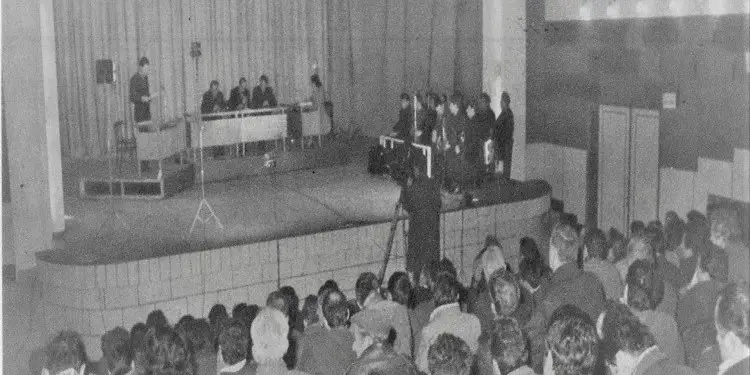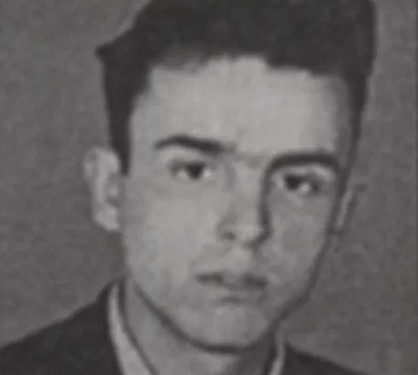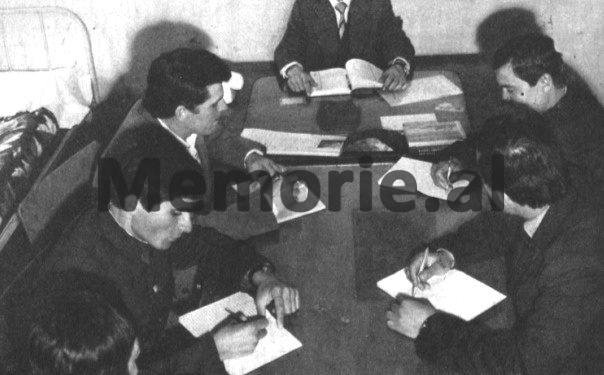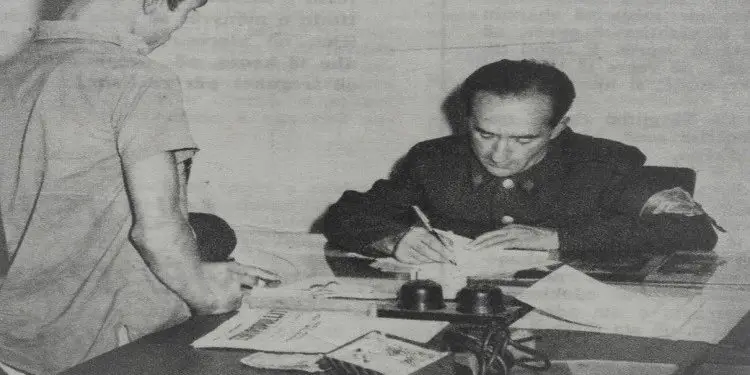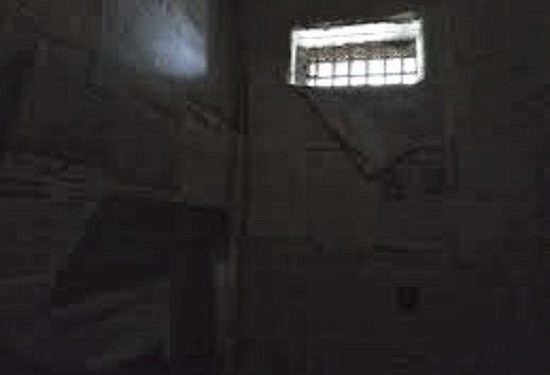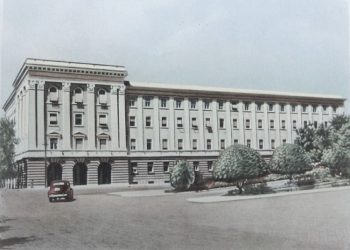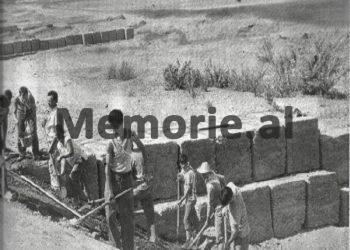By Reshat Kripa
Part fourteen
– “People who have never known dictatorship and tyranny find it easy to give in to the rhetoric about freedom, forgetting the simple and terrible reality of willful oppression where it always exists”.
Giovani Sartori: “Once again for the theory of democracy”.
Memorie.al/ Robert Krasta, had made it a habit that on every anniversary of his parents, he would go to the cemetery and place a bunch of flowers on their grave. He would look at the picture stamped on the porcelain and start a conversation with them. He had been doing this habit for a long time. The conversation seemed to soothe his soul. He told them about everything that had happened in the family. Sometimes, when he found difficulty in something, he asked them for help, and it seemed to him that they answered him. Perhaps this could be some guess of his own, yet he believed it.
Continues from the previous issue
In the city, the echo caused by the sudden death of four employees of the Department of Internal Affairs had not yet died down. The guesses were different. Some believed in the announced version of accidental death, but there were others who thought it was a premeditated death. By whom? No one was able to give this answer! Still, people whispered that something must have happened.
The news is strange. Soon he pierced the walls of the prison and penetrated the ears of the prisoners. The impression this news left on them was different from the one they had outside these walls. Almost all the prisoners, who had suffered terrible torture from them, said:
– God took away our hack. He delays but never forgets.
They only felt sorry for policeman Isufi. He had behaved well with almost everyone. His death depressed them because they did not know who to bring in his place. Probably someone like police officer Myfiti, who had no mercy and whose soul was pitch black.
Agron continued in cell number seven. They no longer interrogated him. His investigation had ended since the black night, when they had confronted him with Lumto and Rida, and now he had to wait until that of the other five friends was also finished and then they would pass it on to the jury. However, even this waiting was a real torture. He thought how much they would punish him. And how would the friends treat him?
After three months, they informed him that the next day, they would appear in court. That day the barber came to cut them and save them.
– Where are you going to take us, dear? Agroni said ironically.
They didn’t answer. The next day, the prison car stopped in front of the Dega gate. The six defendants took them out one by one and got on it. Agroni looked at Stefani and said:
– Stefan, I don’t have…!
– Traitor! – he interrupted in a harsh tone.
Agron was silent.
– Don’t talk anymore. It is forbidden here, – said one of the guards accompanying them.
But they had already closed the conversation. After a while they arrived at the court building. They locked them in the cage prepared for prisoners. There were many familiar faces in the hall. Among them, Agron recognized Stefani’s brother and a cousin of Gjergji, whom he had met when they had come with the usual permit to the Workers’ Rest Camp. He also distinguished the family members of the other arrested persons. He did not see either Mother Gjylon or Lumton. As for Irida, he understood that it could not be. She was too young and this scene was not for her. Their absence worried him greatly. Why were other people’s family members and not his?
There were many other employees of the company in the hall. He knew most of them. Among them were Rasul and Ibrahim.
– Surely they have come to testify, – he thought.
A man in his thirties entered the hall with a large bag in his hand. He went to the table assigned to the prosecutor; he opened his bag, took out a number of papers and sat down on the chair. Agron recognized him. It was the district attorney. He had studied in China. He had had coffee with her several times. After a while, the judge also entered, accompanied by his two assistants, one a welder at the Mechanical Plant and the other an agronomist at the Agricultural Enterprise. When they entered, they all stood up. The judges took their seats and the chairman opened the session
– Defendant Stefan Gjoka!
Stefan stood up.
– The name?
– Stefan.
– Paternity?
– Thanas.
– Surname?
– Chest.
– Birthday?
– October 20, 1943
– Birthplace?
Thus continued the generalities. The chairman asked and Stefani answered calmly. When he was done with it, he called George’s name and so he continued with the six. The defendants responded apparently calmly.
After him, the prosecutor took the floor. He read the indictment for almost two hours and concluded:
– Based on what I said above and based on the Criminal Code of 1952, I charge them with the following:
Service of the Soviet KGB for the overthrow of the people’s power, provided for by Article 65 of this Code.
Sabotage of the country’s economy, through the attempt to blow up the turbine of the hydropower plant, an attempted offense, provided for by Article 72.
Agitation and propaganda against the people’s power, exercised among the company’s employees, provided for by Article 55.
Participation in an organization against popular power, provided for by Article 76.
The prosecutor closed the file and sat in his seat. Agroni was thinking how it was possible to fabricate such slanders. He remembered the time when he had had coffee with him. He seemed like a good man. He didn’t want those words to come out of his mouth.
The chairman called Stefani’s name.
– Do you accept the charge?
– Mr President! Do what you have decided. I do not agree to enter the debate, for such slander.
The chairman continued to question the other defendants. Agron was thinking about how to respond. The terrible scene appeared before his eyes. Could it be repeated? At that time anything could happen. However, the investigation was over and they were already in front of the jury. That scene could not be repeated. After all, both protagonists of that action had suffered. Heard his name. He got up and was standing as if numb.
– Do you accept the charge?
– No, there is no truth there. We are innocent.
He felt relieved. The prosecutor intervened. In a harsh tone, he began to accuse the defendants of fraud and cunning. The chairman began by asking questions for each defendant. But the prosecutor’s interventions were frequent and always harsher. All the defendants answered the charges in the negative. They had already been freed from the anxiety of being in a cell and being tortured. They knew that the only way to save them was to not accept anything.
The prosecutor called the prosecution’s witnesses. A sensible person would immediately understand that what they said was slander of the lowest kind. Even their character matched what they said. They were types that you could hardly call people. However, for the panel, their allegations were convincing. The hearing continued for three hours. All six defendants were questioned. The chairman closed the session, stating that the next one would take place on Friday, after five days, at ten o’clock.
On Friday, the session started at the appointed time. It was the prosecutor’s claim. He left no more mud without throwing it on them. He accused them of espionage and terrorism, of agitation and propaganda and sabotage. He based his accusations on the so-called testimonies given in court. He spoke and spoke for an hour or more and finally closed the lecture with these words:
Based on the above data and based on articles 65, 72, 73 and 76 of the Criminal Code, I request the following punishments:
Defendant Stefan Gjoka, with death by shooting and the loss of civil rights forever.
Defendant Gjergji Pano, with 20 years of deprivation of liberty, forced labor and loss of civil rights for 13 years.
Defendant Agron Canaj, with 15 years of deprivation of liberty, forced labor and loss of civil rights for 10 years.
Defendant Ylli Nivica, with 10 years of deprivation of liberty, forced labor and loss of civil rights for 7 years.
The defendant Gazmend Shpuza, with 8 years of deprivation of liberty, forced labor and the loss of civil rights for 5 years.
The defendant Përparim Seferi, with 5 years of deprivation of liberty, forced labor and the loss of civil rights for 2 years.
The prosecutor was silent. Tears began to flow from the eyes of family members who were in the hall. But they didn’t make a sound. They wiped them with handkerchiefs and more tears rolled down their cheeks. A grave silence covered the hall. Neither applause nor hysterical shouts were heard, as usually happened in such sessions. You seem as if the spectators of that show had suffered these punishments themselves.
The chairman asked the defendants to have the last word. They stood up one after the other and as if they had done it in words, they said:
– We are innocent!
While Agron spoke with a confident voice:
– I am the real culprit. I denounced my friends who were not at fault. Now before you, I reject those accusations, which were taken from me under a pressure never heard before. Convict me of perjury and let them go free. They are innocent.
The president announced that the decision would be given after a week, next Friday.
Agroni addressed his friends in the prison car:
– Can you forgive me?
– Now it is late, – answered Stefani.
The others were silent and no one spoke again.
After a week, they were all in the hall to wait for the decision. Among them was mother Gjyla, whom Syrjau had informed about the trial.
– My son! – she whispered when they entered the hall.
He didn’t cry or scream.
The jury entered the courtroom. Everyone stood up. The chairman read the decision. After making the usual introduction, noting the charges against the defendants, he finally read the verdict: Stefani with death by firing squad, Gjergji with fifteen years in prison, Agroni with twelve, Ylli with eight, while Gazmendi and Pëparimi with five each years. After communicating the punishments, the mayor communicated:
– The defendants have the right to appeal to the High Court in Tirana within a period of fifteen days.
He closed the file and the jury left. The guards started to take the defendants out of the hall. A voice was suddenly heard:
– Stop, I want to meet the boy. I have the right to meet him.
The guards stood. No one dared to stop the mother. She came closer, hugged her son and kissed him on the forehead.
– Stay like a man, son, it’s a prison for men.
– How are you, mother? How are Irida and Lumtua?
– Are you strong son?
– Why mother?
– About what you will hear.
Agron shuddered. His mother’s words shocked him. Something extraordinary had happened.
– Tell us! What happened?
– Something happened that you can’t remember.
A trembling and almost hoarse voice came out of his mouth:
– What?
– Lumtua and Irida flew son, flew in the sky to the great God!
He almost fell to the ground. They kept the Star with Progress. He began to cry with sobs.
– Don’t cry son. Men don’t cry. Look at me. I’m alone and I’m still strong. So should you. I will wait. I won’t die until you come out. Run away now and be safe!
They started. Stefani told him in the car:
– I’m sorry for what happened to you! Both were true angels. Soon I too will take that path. That’s how the world is.
After a month came the response of the Supreme Court. His sentence was as much as the district court had sentenced him. What about Stephen? What about other friends? He didn’t know anything.
One night, in the middle of it, she heard the sound of footsteps and chains in the corridor. He heard a voice:
– Are you ready?
– I am ready!
Get to know Stefani’s voice. He shivered. When footsteps approached his cell, Agroni called out:
– Stefan, sorry!
No answer was received. He had not forgiven her.
After a week, Agron was sent to Spaçi forced labor camp. Memorie.al




